
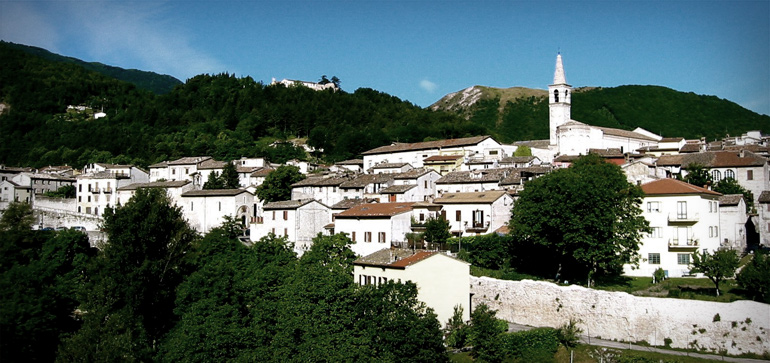
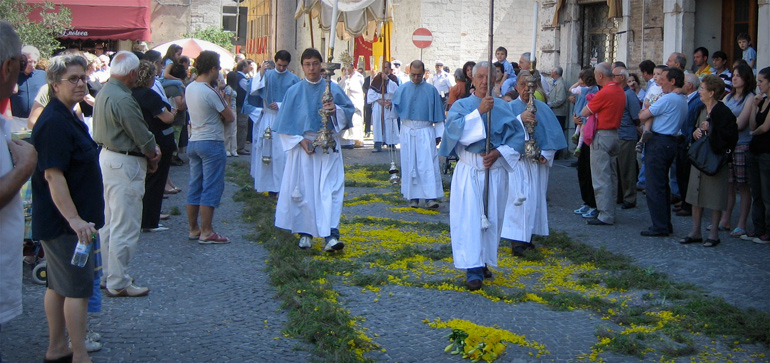
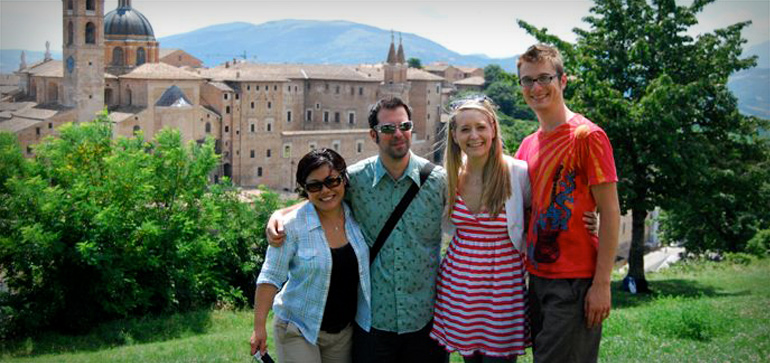
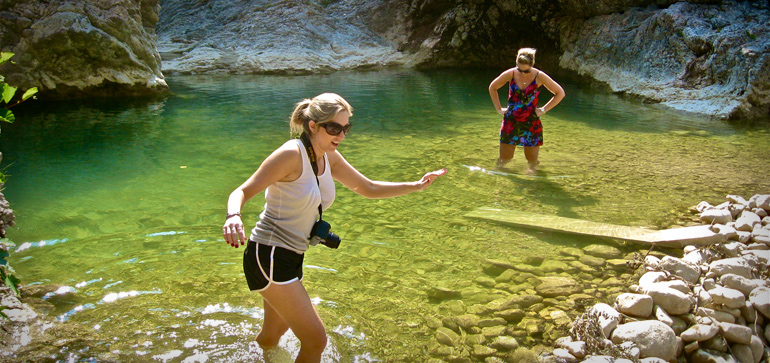
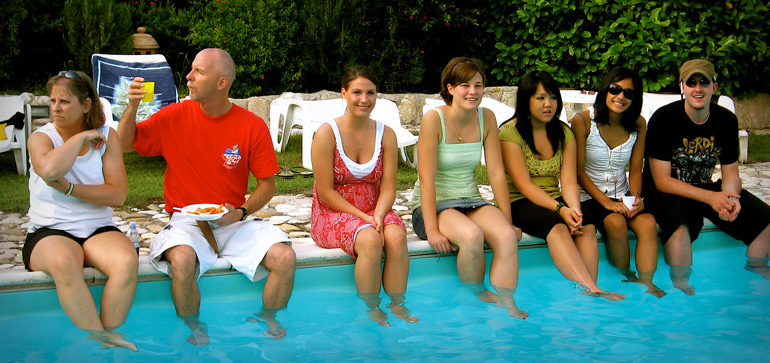
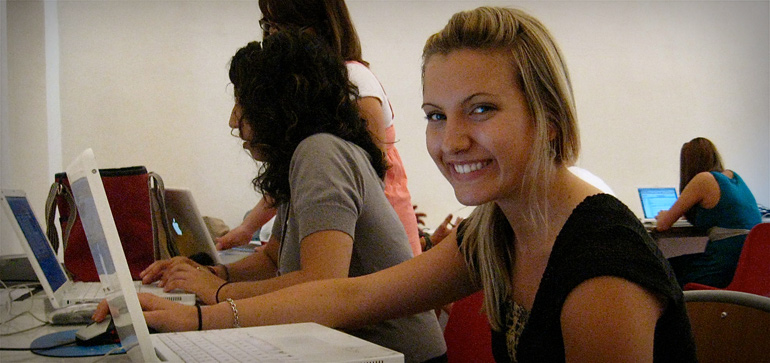
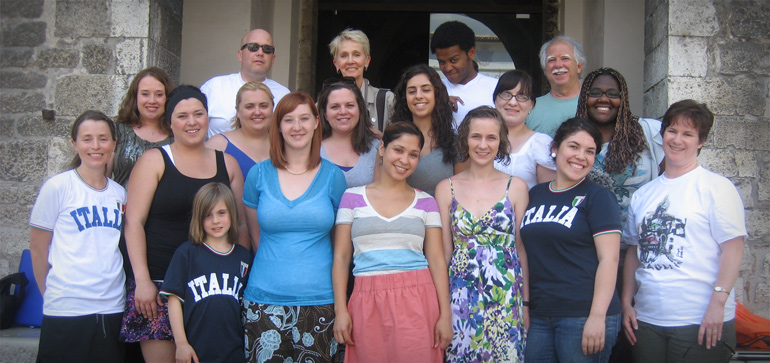
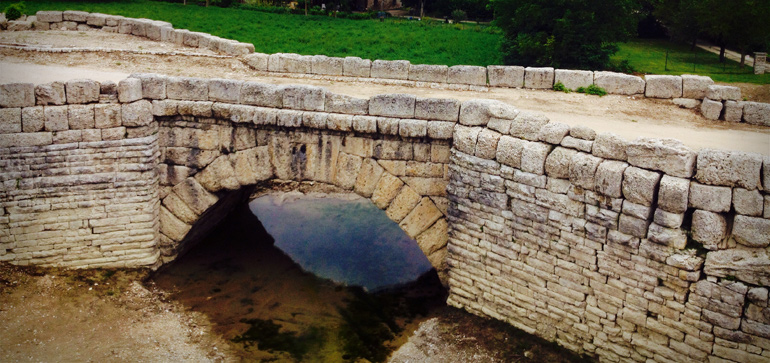
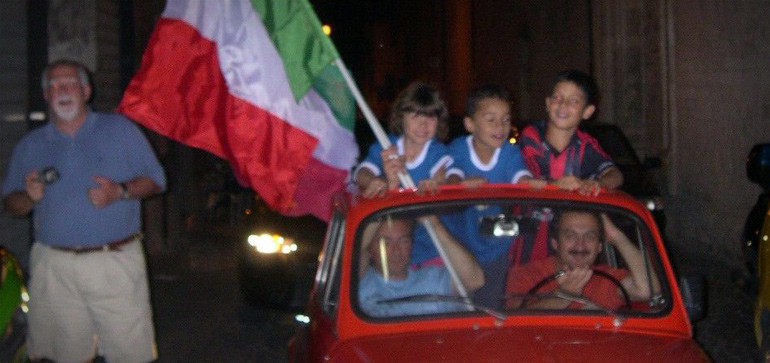
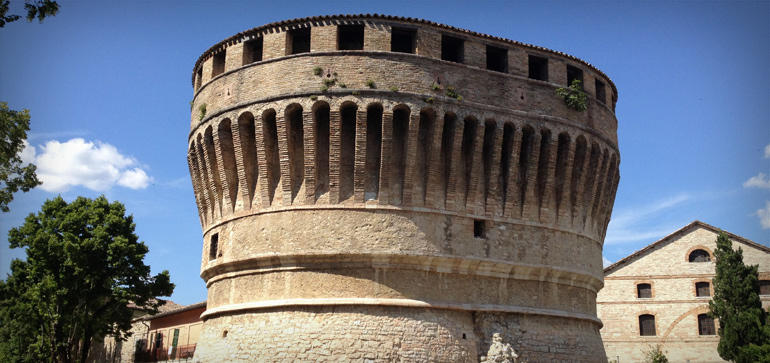
Fast Facts
DATES: June 2 - June 30, 2026
GENERAL LOCATION: Cagli, Italy
ENROLLMENT CAPACITY: 24
FOCUS: ethnographic writing, interviewing, journaling, blogging, photography
PARTNER UNIVERSITY: University of Jamestown
PROJECT COST: $5,995 + airfare
ACADMIC CREDIT: Optoinal 6 units, $900
INCLUDES: Housing, instruction ,travel and health insurance, farewell dinner and special programs, activities and cultural events. Academic Credit is optional. DOES NOT INCLUDE AIRFARE.
The Cagli Project
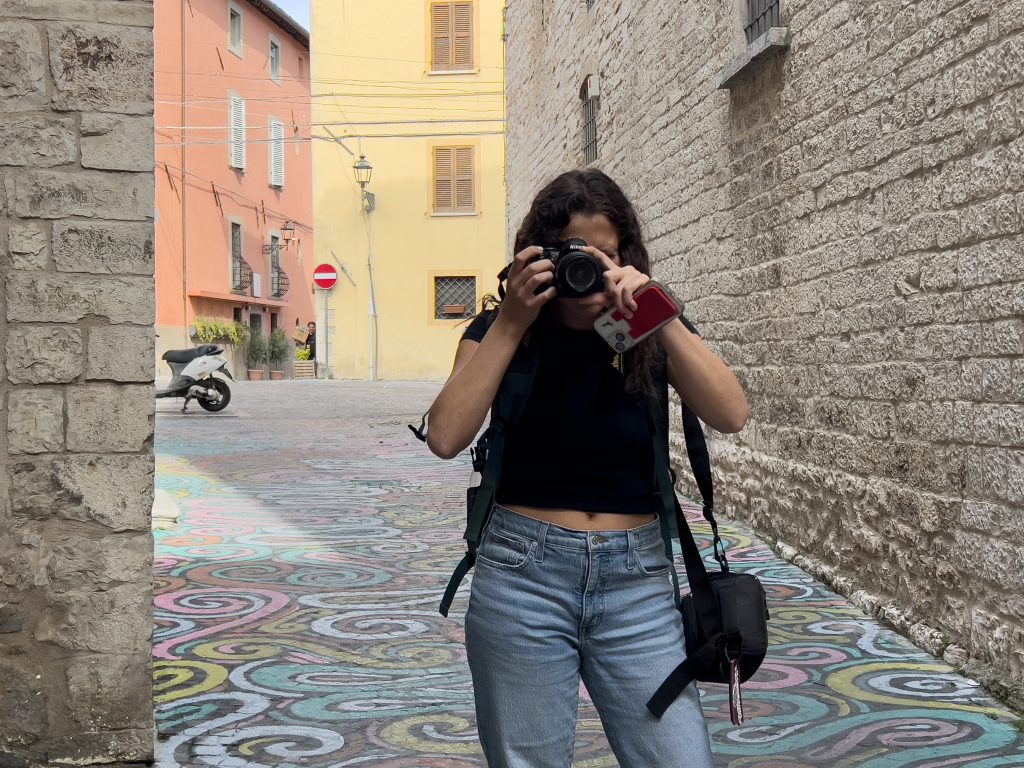 The Cagli Project is a deep cultural immersion that begins in the beautiful Italian medieval “city” of Cagli in the Apennine Mountains and the Renaissance cities of Urbino and the medieval city of Gubbio. Students will join a team who have been building an ethnography of the community. Ethnographic writing helps one learn to understand the culture from an “insider’s perspective.” Students will be on the ancient Via Flaminia from Rome to the Adriatic Sea, where this unique opportunity will give you the tools to acquire practical language and transmedia skills while using proven cultural immersion techniques.
The Cagli Project is a deep cultural immersion that begins in the beautiful Italian medieval “city” of Cagli in the Apennine Mountains and the Renaissance cities of Urbino and the medieval city of Gubbio. Students will join a team who have been building an ethnography of the community. Ethnographic writing helps one learn to understand the culture from an “insider’s perspective.” Students will be on the ancient Via Flaminia from Rome to the Adriatic Sea, where this unique opportunity will give you the tools to acquire practical language and transmedia skills while using proven cultural immersion techniques.
The ability to assimilate quickly and hone in on another culture’s values are indispensable tools for anyone preparing for a career in a world where globalization and multiculturalism are becoming increasingly important. At the micro level, students will learn how to read another culture on their own terms. At the macro level, students will be ready to become facilitators in the intercultural dialogue that the modern world requires. Journalism students will learn a “backpack” style of journalism being a journalist on-the-go, and using a documentary style. You will:
- Understand the role of communication and culture and build your intercultural competence working with diverse populations.
- Develop an awareness and sensitivity to cultural norms and expectations as they are similar to and different from American cultural values, then use this learning in the development of a multimedia project on some aspect of the community
- Understand a culture from an ethnographic insider’s perspective and build your capacity for empathy.
- Display a growing awareness of food, agriculture, and culture as it applies to Italian life style.
- Demonstrate the mechanics and artistry of communication media, then use these skills to tell a narrative about the community in web and book format.
- Learn a more “backpack” style of journalism with the idea of being a journalist on-the-go, and doing documentary style of journalism.
The City
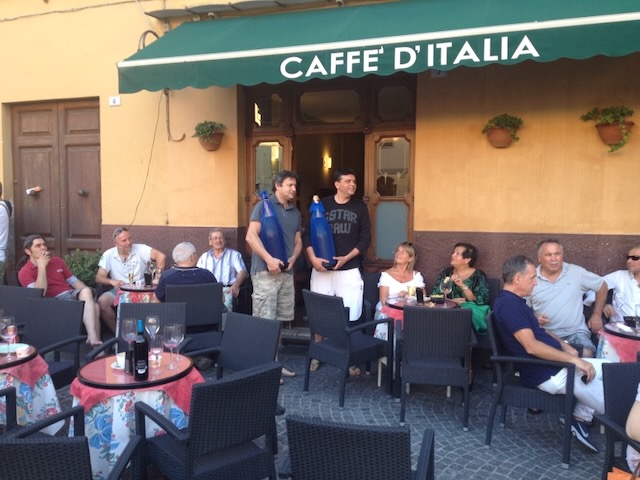 Hidden from tourists among the Apennine Mountains in the Marche region of central Italy, Cagli offers a unique opportunity to explore authentic Italian life. Cagli has a rich history dating back well over 2,000 years. It became part of the Roman Empire in 295 BC and quickly grew in prominence as a vital stop on the ancient Via Flaminia, one of Rome’s earliest and most important roads. After the fall of the Roman Empire, Cagli’s strategic location made it a popular staging ground for battles. In 1287, the city was destroyed by fire in a battle among noble Italian families but was rebuilt two years later under orders from Pope Nicholas IV. Various noble families held Cagli until the Papal States incorporated it in the 17th century, and it became part of unified Italy in 1860.
Hidden from tourists among the Apennine Mountains in the Marche region of central Italy, Cagli offers a unique opportunity to explore authentic Italian life. Cagli has a rich history dating back well over 2,000 years. It became part of the Roman Empire in 295 BC and quickly grew in prominence as a vital stop on the ancient Via Flaminia, one of Rome’s earliest and most important roads. After the fall of the Roman Empire, Cagli’s strategic location made it a popular staging ground for battles. In 1287, the city was destroyed by fire in a battle among noble Italian families but was rebuilt two years later under orders from Pope Nicholas IV. Various noble families held Cagli until the Papal States incorporated it in the 17th century, and it became part of unified Italy in 1860.
Though its history is apparent throughout the town, Cagli boasts a rich modern social scene, with summer concerts and festivals and one of the region’s most beautiful theaters. This city of 9,000 residents is also home to numerous churches, chapels, grocery stores, cafés, restaurants, artisanal shops, soccer fields, a bocce ball club and a hospital. Other outdoor activities include hiking, biking and swimming.
 Despite its relative seclusion, Cagli is easily accessible from Rome via train and bus, with service twice daily. Students can also take advantage of locally run buses throughout the day to important nearby cities such as Gubbio, Urbino and the beach towns of Fano and Pesaro on the Adriatic coast. Using Pesaro as a point of departure, students are able to transfer onto the Trenitalia train network that stretches the entirety of the Italian peninsula to popular destinations such as Rimini, Bologna, Venezia, Assisi, Cinque Terre, Firenze, Milano, Torino, Verona, Pisa, Napoli and the Amalfi coast. Cagli itself, however, is full of charm and has many stories to tell. It truly is la dolce vita!
Despite its relative seclusion, Cagli is easily accessible from Rome via train and bus, with service twice daily. Students can also take advantage of locally run buses throughout the day to important nearby cities such as Gubbio, Urbino and the beach towns of Fano and Pesaro on the Adriatic coast. Using Pesaro as a point of departure, students are able to transfer onto the Trenitalia train network that stretches the entirety of the Italian peninsula to popular destinations such as Rimini, Bologna, Venezia, Assisi, Cinque Terre, Firenze, Milano, Torino, Verona, Pisa, Napoli and the Amalfi coast. Cagli itself, however, is full of charm and has many stories to tell. It truly is la dolce vita!
Travel Opertunities
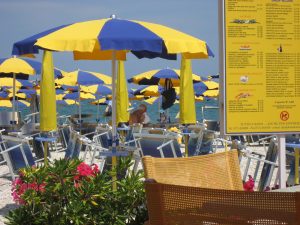
There is a free weekend while you are in Cagli. That allows for an easy bus/train trip to Rome (3 hours each way) or to the seaside towns of Fano or Pesaro. If you want to get away to Venice or Florence, you need to take the bus to Fano/Pesaro and then the train to Venice or Florence. (Weekend travel expenses are the responsibility of students). Many students choose to stay in Cagli. There are evening and casual times at cafés on the piazza along with events in the Opera House and public places. You can take day trips to the beach on the local buses or enjoy the hiking and biking opportunities available. Many students also use this time to continue work on their stories or bus to Gubbio, Perugia or Assisi. On warm days, you can relax in the cool streams within 10 minutes of your apartments. If you would like a longer getaway, consider some add-on extended travel at the end of the project, when classmates might want to join you.
Academic Credit (6)
Students have the option to earn six academic credits of an upper-division journalism elective for this course. The credits will be issued by the University of Jamestown, and we will work with you so they are easily transferable to your university. Transfer credit ultimately depends on a student’s home university. The cost for three academic credit is $900 (See the FAST FACTS at the top of the page for Program Cost).
NOTE: Students on a quarter system will be able to transfer as four(8) credits at no additional fee for ieiMedia courses that are listed as three(6) credits. Transfer credit ultimately depends on a student’s home university. Please check with your university for procedures to follow when transferring credits to your institution.
Students
The program is open to English-speaking college students and recent graduates from any school. Most of our students are journalism, creative writing or communications majors; those majoring in other subjects are welcome as well. Experience working for a college or professional publication is helpful but not required. The program is open to English-speaking students and recent graduates from around the world.Students from many universities have participated in past ieiMedia programs, including:
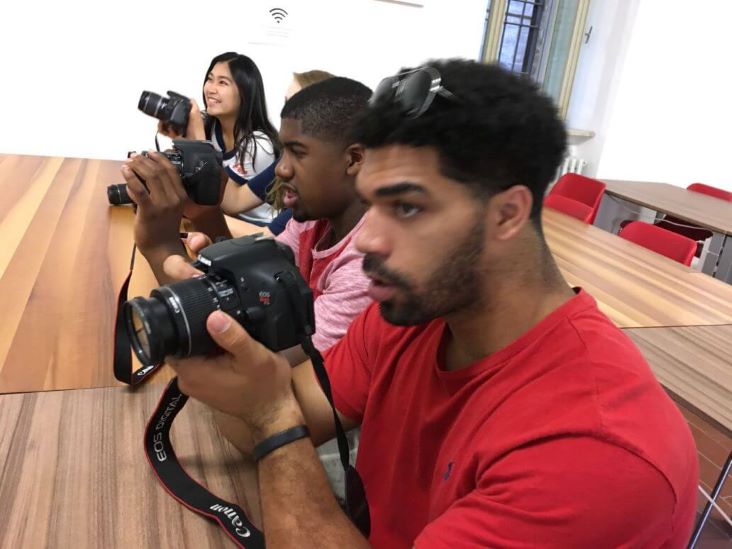
American University, Arizona State University, Baylor University, California State University Fullerton, California State University Long Beach, Carleton University, Colorado State University, Georgia College and State University, Georgetown University, Humboldt State University, Indiana University, Iowa State University, Ithaca College, James Madison University, Louisiana State University, New York University, Rider University, Rutgers University, Ryerson University, San Diego State University, San Francisco State University, State University of New York at New Paltz, Syracuse University, Temple University, Truman State University, UCLA, University of Arizona, University of British Columbia, University of Tennessee at Chattanooga, University of Wisconsin-Madison, University of Wisconsin-Oshkosh, Kennesaw State University, University of Illinois, University of Nebraska-Lincoln, University of Northern Iowa, University of Southern California, University of Wisconsin-Madison, Virginia Tech, and Washington and Lee University. We’ve also had students from Japan, the United Kingdom, Puerto Rico, and Trinidad participate.
Graduates
Graduate students are also invited to apply. We’d be happy to talk with you about supervising an independent project that would qualify for graduate credit at your school – or to offer this experience as a graduate internship.
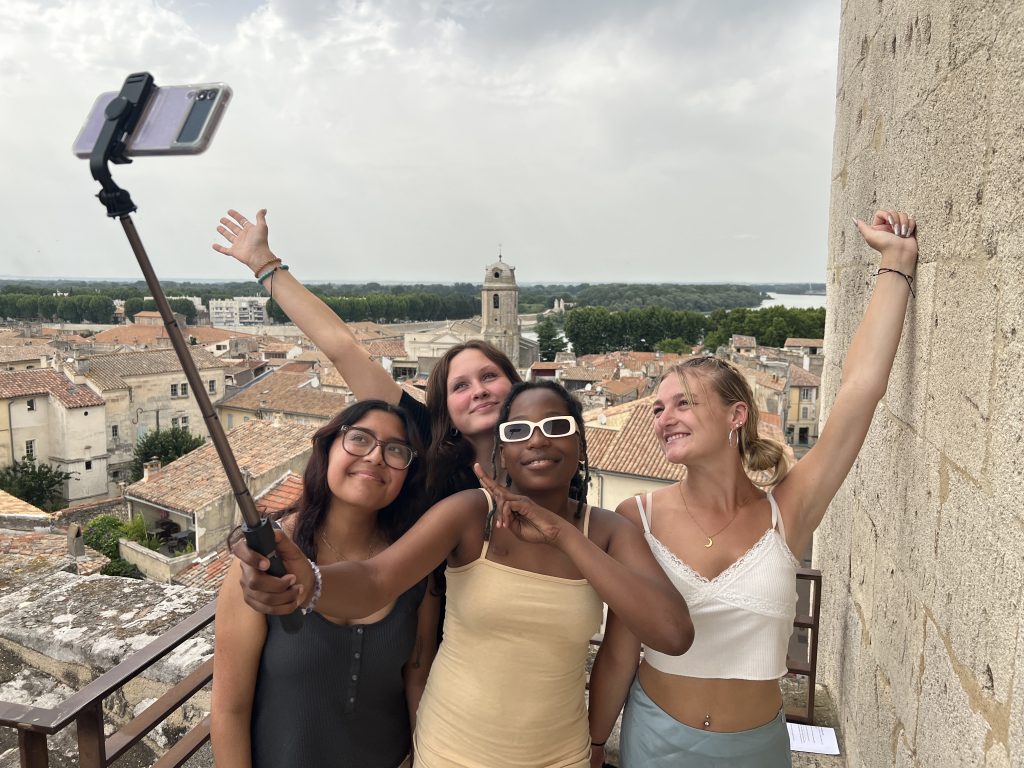
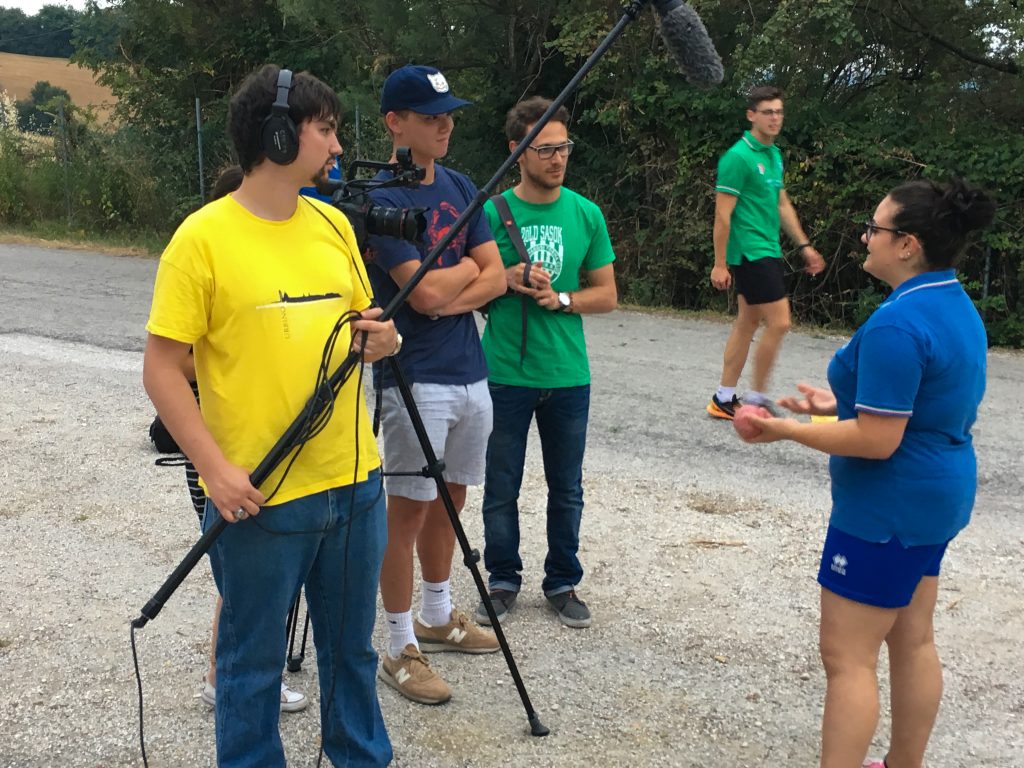
Faculty Director
John Caputo
 John Caputo is Professor Emeritus in the Master’s Program in Communication and Leadership Studies at Gonzaga University and the Walter Ong S.J. Scholar. He founded the MA Program in 2004. Dr. Caputo earned his Ph.D. from the Claremont Graduate School and University Center. He has dual citizenship in the U.S. and Italy. He has been teaching communication courses for more than 35 years and has appeared on radio and television news and discussion programs. His areas of expertise include communication theory, intercultural and interpersonal communication, and media and social values. He is the author of seven books: Effective Communication Handbook; Communicating Effectively: Linking Thought with Expression; Dimensions of Communication; Interpersonal Communication: Competency Through Critical Reasoning, which was co- authored with Bud Hazel and Colleen McMahon; Public Speaking Handbook: A Liberal Arts Perspective with Bud Hazel; McDonaldization Revisited: Critical Essays on Consumer Culture which he co-edited with Mark Alfino and Robin Wynyard for Praeger Press and his newest book, Effective Communication. John Caputo has written more than 35 articles in professional journals, has been honored as a Visiting Scholar In-Residence at the University of Kent at Canterbury, England, La Sapienza University of Rome and the Master’s Program in Media and Communication at the Universita de Firenze, Italy. He has been honored with Master Teacher Awards by the Western States Communication Association and the University of Texas at Austin and has received an Exemplary Faculty Award from Gonzaga University. He has been taking student groups to Italy for many years and has been part of the Cagli Project since 2002. In 2016 he helped create a Sister City between Spokane, Washington and Cagli, Italy. He was made an Honorary Citizen of the city of the City of Cagli, Italy, and is the President of the Sister Cities Association of Spokane, Washington.
John Caputo is Professor Emeritus in the Master’s Program in Communication and Leadership Studies at Gonzaga University and the Walter Ong S.J. Scholar. He founded the MA Program in 2004. Dr. Caputo earned his Ph.D. from the Claremont Graduate School and University Center. He has dual citizenship in the U.S. and Italy. He has been teaching communication courses for more than 35 years and has appeared on radio and television news and discussion programs. His areas of expertise include communication theory, intercultural and interpersonal communication, and media and social values. He is the author of seven books: Effective Communication Handbook; Communicating Effectively: Linking Thought with Expression; Dimensions of Communication; Interpersonal Communication: Competency Through Critical Reasoning, which was co- authored with Bud Hazel and Colleen McMahon; Public Speaking Handbook: A Liberal Arts Perspective with Bud Hazel; McDonaldization Revisited: Critical Essays on Consumer Culture which he co-edited with Mark Alfino and Robin Wynyard for Praeger Press and his newest book, Effective Communication. John Caputo has written more than 35 articles in professional journals, has been honored as a Visiting Scholar In-Residence at the University of Kent at Canterbury, England, La Sapienza University of Rome and the Master’s Program in Media and Communication at the Universita de Firenze, Italy. He has been honored with Master Teacher Awards by the Western States Communication Association and the University of Texas at Austin and has received an Exemplary Faculty Award from Gonzaga University. He has been taking student groups to Italy for many years and has been part of the Cagli Project since 2002. In 2016 he helped create a Sister City between Spokane, Washington and Cagli, Italy. He was made an Honorary Citizen of the city of the City of Cagli, Italy, and is the President of the Sister Cities Association of Spokane, Washington. Faculty
Paula Nelson

Paula Nelson works with both graduate and undergraduate students guiding them to discover their creative potential and to emphasize intention in every aspect of still image making, editing, and sequencing – all elements of visual storytelling. Using a visual language that demonstrates a deep understanding of the power of each image singularly as well as in sequence, students create compelling visual narratives.
A storyteller at heart, Paula Nelson began her career of more than 30 years as a staff photographer at The Dallas Morning News. Part of a small team of journalists, she was awarded the Pulitzer Prize for International Reporting for “Violence Against Women: A Question of Human Rights.†She documented sex-selective abortion, dowry burnings and the sex trade of minors in India and Thailand. Nelson traveled to 48 countries, around the U.S. and across Texas photographing breaking news, multi-picture feature stories, sports, food and fashion. She was recognized with top photography honors from the NPPA, Southern Short Course, the Katies, POY and as a skilled picture editor with strong storytelling abilities from the International Pictures of the Year. Nelson became a picture editor and Assistant Director of Photography, shepherding her colleagues’ award-winning photography into publication both online and in print.
In 2002, as Page One picture editor at The Boston Globe, she set the visual philosophy and selected images for display illustrating the top stories of the day. During the Afghanistan and Iraq wars, she edited from tens of thousands of images daily for publication in special sections. The following year, as director of photography, Nelson managed a staff of 31 visual producers – both still and video – and led the effort to build an online visual presence, including the groundbreaking visual blog, The Big Picture. She worked in concert with renowned editor, Marty Baron, to set the bar for storytelling visuals and for adherence to strict ethical standards. As Assistant Managing Editor for Photography – the first for The Globe and the highest rank in the newsroom for a visual professional – she continued her leadership. The Boston Globe was awarded the 2014 Pulitzer Prize for its multimedia coverage of the marathon tragedy that included visuals produced under Nelson’s leadership. In conferring its breaking news award, the Pulitzer board cited the “Globe’s ‘exhaustive and empathetic’ coverage of the Boston Marathon bombings and ensuing manhunt that enveloped the city, using photography and a range of digital tools to capture the full impact of the tragedy.â€
Kristine Crane
 Kristine Crane is an adjunct instructor at the University of Florida’s College of Journalism and Communications in Gainesville, where she is also working on a doctorate. She began her journalism career in Rome, Italy, writing for The Wall Street Journal and Religious News Service, as well as two English-language start-ups, Italy Daily, an insert to the International Herald Tribune, and The American in Italia, now an online magazine for which she writes a monthly column. She helped cover the death of Pope John Paul II for the WSJ, and one of her stories was nominated for the Peter R. Weitz Journalism Prize for transatlantic reporting. She’s fluent in Italian and had a Fulbright to study migration in Italy. She later returned to the U.S. to attend the Columbia School of Journalism for a Master’s in science reporting and then worked as a health and science reporter for publications in Washington D.C., including U.S. News & World Report, and newspapers in Florida, where she received the Sunshine State Award for health reporting. She’s taught courses at UF in digital storytelling, multimedia reporting, and narrative nonfiction, and she’s an advisor of Atrium, student-led nonfiction publication. She’s freelanced journalism for various publications, along with essays and poems. She holds an MFA from Pacific University. In 2021, one of her poems was recognized in the Giuseppe Carpanacci National and International Poetry and Prose Competition. She will join the Cagli team in the summer of 2024.Â
Kristine Crane is an adjunct instructor at the University of Florida’s College of Journalism and Communications in Gainesville, where she is also working on a doctorate. She began her journalism career in Rome, Italy, writing for The Wall Street Journal and Religious News Service, as well as two English-language start-ups, Italy Daily, an insert to the International Herald Tribune, and The American in Italia, now an online magazine for which she writes a monthly column. She helped cover the death of Pope John Paul II for the WSJ, and one of her stories was nominated for the Peter R. Weitz Journalism Prize for transatlantic reporting. She’s fluent in Italian and had a Fulbright to study migration in Italy. She later returned to the U.S. to attend the Columbia School of Journalism for a Master’s in science reporting and then worked as a health and science reporter for publications in Washington D.C., including U.S. News & World Report, and newspapers in Florida, where she received the Sunshine State Award for health reporting. She’s taught courses at UF in digital storytelling, multimedia reporting, and narrative nonfiction, and she’s an advisor of Atrium, student-led nonfiction publication. She’s freelanced journalism for various publications, along with essays and poems. She holds an MFA from Pacific University. In 2021, one of her poems was recognized in the Giuseppe Carpanacci National and International Poetry and Prose Competition. She will join the Cagli team in the summer of 2024.Â
Giovanni Caputo
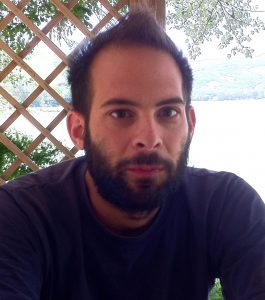 Giovanni has dual Italian and American citizenship and speaks half a dozen languages. Aside from teaching in Italy, Giovanni has spent time teaching at various levels in the French public school system. Back in the U.S., he works as a French translator and graphic designer. Giovanni’s academic interests include journalism, short story writing and storytelling. In addition to teaching a course on journaling in last year’s Cagli program, he was also the editor of the Armagh Examiner and Around Armagh, online news and information blogs created for the program InArmagh 2007. Giovanni has been with the GonzagainCagli project since 2009 and deso the layout and design of the books and program materials inlcuding posters and handbook.
Giovanni has dual Italian and American citizenship and speaks half a dozen languages. Aside from teaching in Italy, Giovanni has spent time teaching at various levels in the French public school system. Back in the U.S., he works as a French translator and graphic designer. Giovanni’s academic interests include journalism, short story writing and storytelling. In addition to teaching a course on journaling in last year’s Cagli program, he was also the editor of the Armagh Examiner and Around Armagh, online news and information blogs created for the program InArmagh 2007. Giovanni has been with the GonzagainCagli project since 2009 and deso the layout and design of the books and program materials inlcuding posters and handbook.
APPLICATION, PAYMENTS, AND WAITLISTS
APPLICATION DEADLINE: Our formal deadline has passed, but we are still accepting applications for summer 2025 as long as spots remain available. Please review our application instructions and reach out to admissions@ieimedia.com if you have any questions. We are here to support you through the application process and are so excited to learn more about your interest in studying abroad with ieiMedia! If you have questions about applying, you can also start a conversation with us by clicking the Get Started button. Please refer to the Application Deadline Details for more information.
PAYMENT DEADLINES: see Payment, Cancelation and Refund Policy for information on deposit deadlines and amounts.
ENROLLMENT CAPACITY AND WAITLISTS: ieiMedia projects have a defined capacity limitation for applicants. Since there is a limited number of applicants who can attend, you can only be guaranteed a spot when you (1) have paid your Application Fee and (2) made payments on time according to the Costs and Payment Schedule. If a program has reached capacity OR you have not met the requirements for enrollments, you will be placed on the waitlist until requirements are met and capacity is available.
ACADEMIC CREDIT
Academic credits can be earned for this ieiMedia Project. Requesting course credit is optional. This course offers an option to earn upper-division journalism elective credits. The cost for academic credit is $150/credit. Students choosing this option must indicate so in their application. After applying, student will find procedures in our Student Portal to request academic credit through our school of record, University of Jamestown. NOTE: Students on a quarter system will be able to transfer as four(4) or eight(8) credits at no additional fee for ieiMedia courses that are listed as three(3) or six(6) credits respectively. Transfer credit ultimately depends on a student's home university. Please check with your university for procedures to follow when transferring credits to your institution.
Application Details, Travel Advisory, Financial Aid
Application Deadline Details
Our formal deadline has passed, but we are still accepting applications for summer 2025 as long as spots remain available. Please review our application instructions and reach out to admissions@ieimedia.com if you have any questions. We are here to support you through the application process and are so excited to learn more about your interest in studying abroad with ieiMedia!
If you do not have the necessary access to submit your application, please reach out to admissions@ieimedia.com to speak with an advisor.
Get started now to reserve your place or contact the ieiMedia Director of Admissions at: admissions@ieimedia.com
APPLICATION DEADLINE: Our formal deadline has passed, but we are still accepting applications for summer 2025 as long as spots remain available. Please review our application instructions and reach out to admissions@ieimedia.com if you have any questions. We are here to support you through the application process and are so excited to learn more about your interest in studying abroad with ieiMedia!
Travel Advisory
ieiMedia will be monitoring The US Department of State Travel Advisories and will provide status updates to those who sign up for the project regarding important information.
Financial Aid
Students studying abroad for the summer term have limited financial aid options, but Pell grant recipients are encouraged to apply and receive our help in applying for a Gilman Study Abroad Scholarship which can award up to $5,000. Check with your school’s financial aid office and your study abroad offices to find out if other assistance is available. For more information on financial aid, get started by connecting with us here.
QUESTIONS? Contact the ieiMedia Director of Admissions at admissions@ieimedia.com You can also schedule an ieiMedia advising session.
Past information session recordings and slides can be viewed here.
